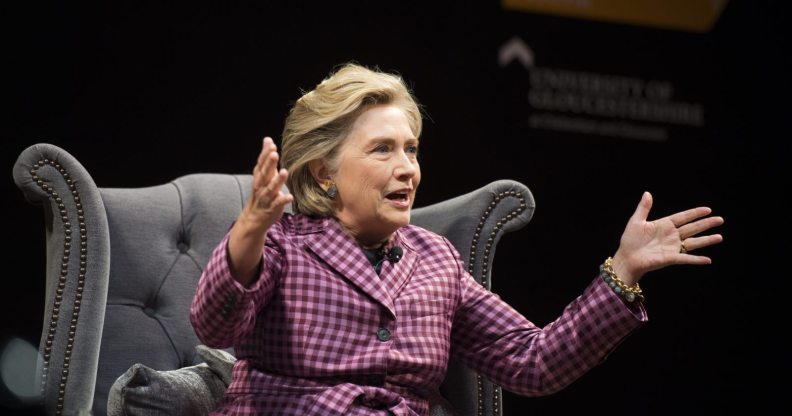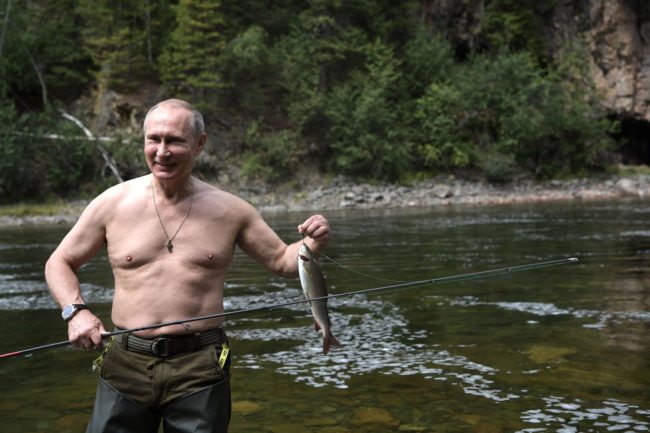Hillary Clinton responds to Russian government’s secret gay Facebook page

(Getty)
Hillary Clinton has responded to news that the Russian government secretly ran a Facebook page aimed at gay Americans.
It was confirmed earlier this month that a massive Russian propaganda effort on Facebook had targeted US civilians on Facebook.
Facebook has shuttered hundreds of pages that are believed to be linked to the Russian state.
One of the pages, LGBT United, was targeted at the LGBT community and posed as supportive of LGBT rights.
Posts from the page received more than 5 million shares – while other pages targeted other minority groups including African-Americans and Muslim-Americans.

(Photo by ALEXEY NIKOLSKY/AFP/Getty Images)
Speaking at Cheltenham literary festival, former Democratic Presidential candidate Hillary Clinton opened about the Russian “information war”.
“We know Russian agents used Facebook, YouTube, Twitter and even Pinterest to place targeted attack ads and negative stories intended not to hurt just me but to fan the flames of division in our society.
“Russians posed as Americans pretending to be LGBT and gun rights activists, even Muslims, saying things they knew would cause distress.”
She added: “The Russians are still playing on anything and everything they can to turn Americans against each other.
“In addition to hacking our elections, they are hacking our discourse and our unity. We are in the middle of a global struggle between liberal democracy and a rising tide of illiberalism and authoritarianism.
“This is a kind of new cold war and it is just getting started.”

Russian President Vladimir Putin (Photo by ALEXEY NIKOLSKY/AFP/Getty Images)
Speaking about Russian involvement in the election to the BBC’s Andrew Marr, she added: “The Russians wanted to help Trump and hurt me. In their wildest dreams they wanted to elect him and defeat me.
“Our intelligence community says Putin had a personal grudge against me, in part because as Secretary of State I spoke out about human rights abuses, illegitimate activities in Russia.
“[Putin] wants to undermine NATO and the EU, and American stability. He has a lot of practise from Soviet days into the present, in doing propaganda.
“Having content farms in places like Macedonia pumping out fake news. Having Russians posing as Americans, and not just to denigrate me, which was a big part of what they did, but to sow distrust and division.”
The LGBT United page itself seldom referenced the 2016 election, primarily dedicating itself to building an influence base among LGBT people, as well as potentially ‘drowning out’ election coverage from legitimate LGBT outlets.
Much of its activity was dedicated to sharing memes and posts supportive of LGBT people, with its fictional author referring to herself as a lesbian.
It did appear critical of mainstream Republicans, branding a supporter of Ted Cruz a “thunderc*nt”.
Social media analyst Jonathan Albright, research director of the Tow Center for Digital Journalism at Columbia University, said: “The tone of the posts [from the different pages] varies strikingly… the one seemingly managed by a lesbian is intimate, confidential and chatty, with complaints about parents and teachers not understanding the challenges of being young and gay.
“The English is nearly flawless. One popular post said simply, ‘Bi and proud!’ with a thumbs-up emoji attached to the end.”
He added: “The goal seemed less to inspire enthusiasm for one candidate than to dampen support for voting at all.”
Ironically, many of the Russian government-sanctioned posts – which positively celebrate LGBT rights – would be illegal on Russian social media platforms under the country’s laws outlawing gay ‘propaganda’.
The pages have since been shuttered by Facebook.
In a blog, Elliot Schrage, Facebook’s Vice President of Policy and Communications, addressed the growing scandal.
He said: “Approximately 470 accounts and Pages we shut down recently were identified by our dedicated security team that manually investigates specific, organized threats. They found that this set of accounts and Pages were affiliated with one another — and were likely operated out of Russia.”
He added that it was possible there were more pages undiscovered.
Schrage said: “When we’re looking for this type of abuse, we cast a wide net in trying to identify any activity that looks suspicious. But it’s a game of cat and mouse.
“Bad actors are always working to use more sophisticated methods to obfuscate their origins and cover their tracks.
“That in turn leads us to devise new methods and smarter tactics to catch them — things like machine learning, data science and highly trained human investigators. And, of course, our internal inquiry continues.
“It’s possible that government investigators have information that could help us, and we welcome any information the authorities are willing to share to help with our own investigations.
“Using ads and other messaging to affect political discourse has become a common part of the cybersecurity arsenal for organized, advanced actors.
“This means all online platforms will need to address this issue, and get smarter about how to address it, now and in the future.”
Meanwhile, Special Counsel Robert Mueller is overseeing an investigation into any links or coordination between Russian government and individuals associated with the campaign of President Donald Trump”.
Related: Trump-backed Senate candidate has praised Russia’s gay propaganda law

